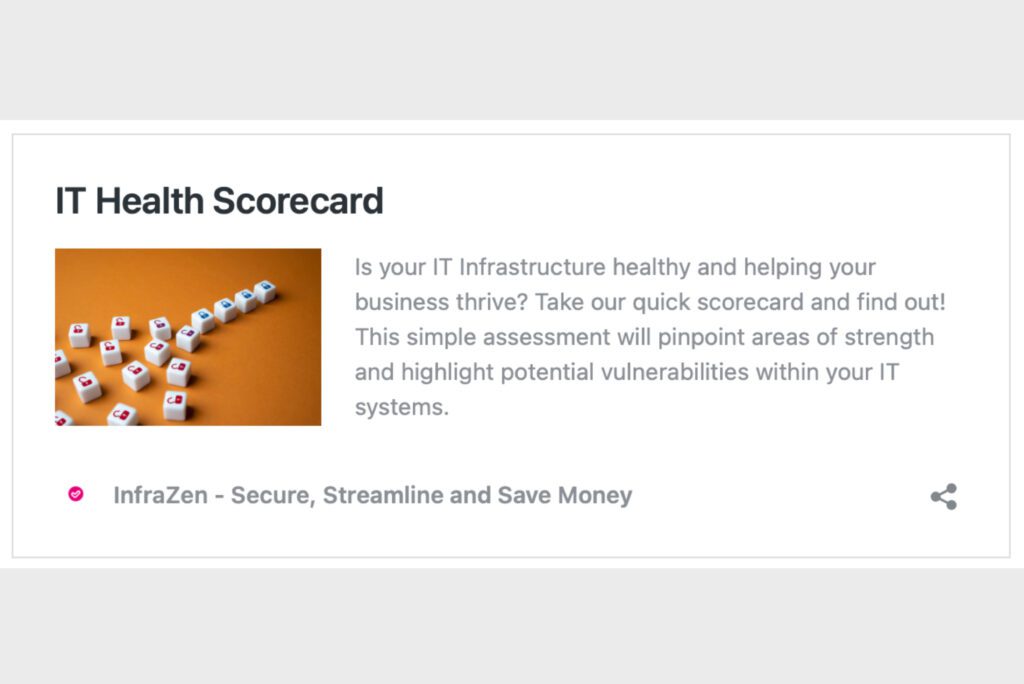Let’s Look at Why you DON’T Need a Managed Services Provider
Show me a modern, successful business that is not reliant on IT infrastructure, and I’ll eat my hat (note to self… buy a hat). Whether you’re managing customer data, communicating with clients, or ensuring your website stays up and performs well online, technology plays a crucial role in your success. With this reliance comes the question:
Do you need a Managed Services Provider (MSP) to help maintain and optimise your IT needs?
At first glance, it may seem like a simple decision. After all, the allure of keeping everything in-house—maintaining control over your systems, saving money, and leveraging your internal team’s skills—can be strong. But what if the case against hiring an MSP is actually the opposite? This post explores the reasons why businesses might think they don’t need an MSP and, in doing so, explains why many companies could significantly benefit from managed IT services.
1. “We Have an Internal IT Team”

One of the most common reasons businesses resist engaging an MSP is the belief that their internal IT team is sufficient. If you already have staff dedicated to technology, why would you need an external partner? On the surface, this makes sense. But let’s dig deeper.
While an internal IT team is valuable, they may not have the bandwidth to handle everything. Technology is constantly evolving, and the demands on your IT team are growing as a result. They may be able to manage day-to-day issues, but strategic planning, system optimisation, cybersecurity, and staying on top of emerging technologies require time, expertise, and resources. This is where an MSP can step in.
According to etedgeinsights.com:
Why You Might Actually Need an MSP:
Supplementing Expertise: An MSP offers specialised knowledge across multiple areas, from cybersecurity to cloud computing. They bring a depth of expertise that your internal team may not have (or have the time to acquire).
Scalability: As your business grows, your IT needs become more complex. An MSP can scale their services up or down based on your requirements, ensuring that your IT infrastructure evolves alongside your company.
Freeing Internal Resources: Partnering with an MSP doesn’t mean replacing your IT team—it means allowing them to focus on core, mission-critical tasks while the MSP manages routine maintenance, monitoring, and support.
2. “We Want to Control Our IT Systems”

The desire to maintain control over business operations is another common reason companies shy away from MSPs. Decision-makers often fear that outsourcing IT could lead to a loss of control over critical systems and data.
However, this is a misconception. MSPs are partners, not replacements. Their role is to support your business, enhance the reliability and security of your systems, and ensure that you retain ultimate control over your IT operations.
According to security ifowatch.com:
Why You Might Actually Need an MSP:
Proactive Management: MSPs work closely with businesses to design solutions tailored to their specific needs. You maintain control of strategic decisions, while the MSP ensures your systems are operating smoothly, efficiently, and securely.
Reduced Downtime: By managing and monitoring your systems 24/7, an MSP ensures problems are identified and addressed before they cause significant disruption. This level of proactive oversight keeps your business running smoothly while giving you control over your operations.
Vendor Management: If you rely on multiple vendors for different IT services, managing those relationships can be time-consuming and complex. MSPs streamline this process, acting as a single point of contact and ensuring all vendors are working effectively.
3. “Managed Services Are Too Expensive”

For just about every small and mid-sized businesses, budget constraints are a real concern. The idea of paying for managed services can seem like an unnecessary expense, especially if you’re managing your IT needs on your own. However, what many companies fail to realise is that an MSP can actually save money in the long run.
While there’s an upfront cost to hiring an MSP, the value lies in preventing costly downtime, security breaches, and inefficient systems. When you weigh the cost of potential IT disasters against the predictable monthly cost of managed services, the equation often becomes clearer.
It’s also worthwhile considering the cost of hiring one single member of staff for a year (working office hours) when compared with the 24/7 service an MSP can provide. Even if you were paying your technical specialist minumum wage (which they would never accept since a specialist technical memeber of staff would be commanding in the region of 65k / year):
£11.44 / hour x 40 hours per week = 457.60 x 52 = £23,795.20. paid to hire an employee at min wage at 40 hours per week.
A dedicated MSP on the other hand would be working 24/7 and charging perhaps 1/5 to 1/4 of that (depending upon the expertise of the MSP). That is without legal, employers insurance, recruitment and holiday / sick pay that you would pay for an employee.
According to centralnetworks.co.uk:
Why You Might Actually Need an MSP:
Predictable IT Costs: MSPs operate on a subscription model, meaning you pay a flat, predictable fee each month. This allows for better budget planning and avoids the surprise costs that can arise from emergency fixes or system failures.
Reduced Downtime: Downtime can be extremely costly for businesses, particularly when it results in lost sales, productivity, or customer trust. MSPs minimise downtime through proactive maintenance and monitoring, saving you money over time.
Prevention of Major IT Issues: Cybersecurity threats, system failures, and data loss can be devastating, both financially and reputationally. An MSP helps prevent these costly events by implementing robust security measures, backup systems, and proactive monitoring.
4. “We Can Handle Cybersecurity Ourselves”

Another common belief is that cybersecurity is something your internal team can handle without external help. Many businesses think that as long as they have antivirus software, firewalls, and strong passwords, they’re secure enough.
The reality is that cybersecurity threats are more sophisticated and frequent than ever before. Hackers are constantly finding new ways to exploit vulnerabilities, and without specialised knowledge, businesses can leave themselves exposed to costly attacks.
Why You Might Actually Need an MSP:
Specialised Cybersecurity Expertise: MSPs have dedicated teams that stay up-to-date on the latest threats and trends in cybersecurity. They provide advanced protection, from network monitoring to threat detection and response.
Regulatory Compliance: If your business operates in a regulated industry (such as healthcare, finance, or legal), you are required to adhere to specific security standards. MSPs ensure that your systems meet these requirements, avoiding costly fines and legal trouble.
Incident Response and Recovery: In the event of a cyberattack, every second counts. MSPs have the tools and expertise to respond immediately, mitigate damage, and restore your systems to operational status.
5. “We Don’t Need 24/7 Support”

It’s easy to assume that if your business operates during standard hours, you don’t need IT support outside of that time. However, IT problems don’t adhere to a 9-to-5 schedule. Servers can crash, systems can fail, and security threats can emerge at any time.
Relying on an internal team to respond to these issues after hours can lead to delayed resolutions and extended downtime. MSPs, on the other hand, provide 24/7 monitoring and support, ensuring your systems are always protected and operational.
Cyber-attacks can happen at any time and the costs can be more than financial. According to the financial times, a major attack on the NHS caused severe problems:
Why You Might Actually Need an MSP:
Constant Monitoring: MSPs monitor your systems around the clock, identifying and resolving issues before they escalate. This proactive approach ensures that your business remains operational, even outside of regular working hours.
Global Operations: If your business operates globally or serves clients in different time zones, having around-the-clock support is essential for delivering reliable service. MSPs can provide this level of support, ensuring that issues are addressed no matter when or where they occur.
Peace of Mind: Knowing that your systems are being monitored and maintained 24/7 allows you and your team to focus on core business activities, without the worry of IT failures disrupting your operations.
6. “We Can’t Trust an External Company with Our Data”

Data privacy and security are paramount for every business, and entrusting sensitive information to an external provider can understandably make some companies nervous. However, MSPs are in the business of safeguarding their clients’ data and ensuring that privacy is maintained to the highest standards.
In fact, partnering with an MSP can often improve your data security by implementing best-in-class solutions, ensuring compliance with regulations, and providing advanced encryption and security measures.
Why You Might Actually Need an MSP:
Data Security Best Practices: MSPs are experts in data security, ensuring that your information is protected with the latest technologies and strategies, from encryption to access controls.
Compliance Assurance: If your business is required to comply with regulations such as GDPR, HIPAA, or PCI-DSS, an MSP can help you navigate these complex requirements, ensuring that your data management practices are in line with legal standards.
Disaster Recovery: MSPs offer backup and disaster recovery solutions that ensure your data is safe and accessible, even in the event of a system failure or cyberattack.
7. “We’re Too Small for an MSP”

Smaller businesses often feel that MSPs are only for large enterprises with complex IT needs. The assumption is that managed services would be overkill for a small or mid-sized company. However, this couldn’t be further from the truth.
In fact, smaller businesses can benefit even more from an MSP, as they often lack the internal resources to effectively manage IT on their own. Managed services can provide small businesses with the tools, expertise, and support they need to compete with larger companies.
More and more SME’s are turning to MSPs to completely manage their IT infrastructure. According to channelfutures.com:
Why You Might Actually Need an MSP:
Access to Enterprise-Level Solutions: MSPs provide small businesses with access to the same tools and technologies used by larger enterprises, levelling the playing field and helping them stay competitive.
Cost Efficiency: For small businesses, hiring a full-time IT staff or investing in the latest technology may not be financially feasible. MSPs offer a cost-effective solution by providing top-tier IT support at a fraction of the cost.
Focus on Core Activities: By outsourcing IT management to an MSP, small businesses can focus on what they do best—running and growing their business. With an MSP handling your IT needs, you won’t need to worry about technical issues slowing you down.
Why You May Actually Need a Managed Services Provider
While it might seem like your business doesn’t need a Managed Services Provider, the truth is that many companies, regardless of size or industry, stand to gain from the expertise, efficiency, and peace of mind that an MSP can provide. The reasons you might think you don’t need one—such as cost concerns, the presence of an internal IT team, or fears over loss of control—often turn out to be misconceptions.
The reality is that MSPs can:
Supplement your internal IT team with specialised knowledge and 24/7 monitoring.
Save your business money in the long run by preventing costly downtime and IT disasters.
Ensure data security and compliance with industry regulations, reducing your risk of breaches or fines.
Allow your business to scale efficiently, adapting to your IT needs as you grow.
Provide proactive support, ensuring problems are solved before they escalate.
There’s no escaping it, we live in a technology-driven world and the demands on your IT systems are only going to increase. Whether you’re a small business owner trying to stay competitive or a larger company looking to optimise your operations, partnering with an MSP can provide the stability, security, and expertise needed to thrive.
The question isn’t whether your business can benefit from an MSP—it’s how much your business can grow when you have the right IT support in place. If you’re ready to improve your operations, enhance your security, and gain peace of mind, a Managed Services Provider might be exactly what you need.
How well is Your Business Performing?
Take our FREE test to see how your IT systems are holding up. Click below and good luck.


